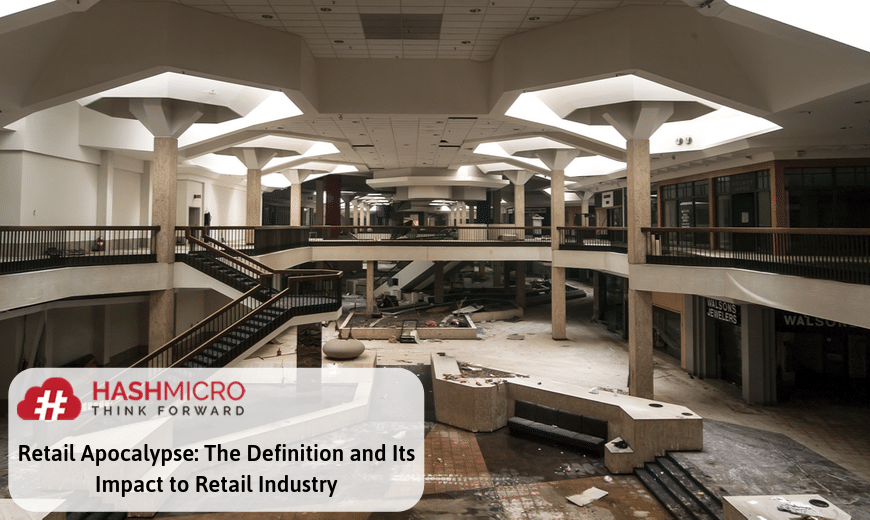Still fresh in our minds how shocking it was when giant retailers such as Bloomingdale or Toys ‘R Us closed their stores and went bankrupt. The news even became a trending topic on several social media for a while. Many people suspect that the retail apocalypse began to hit Indonesia and poor retail management was one of the factors.
To avoid this, companies can switch to using ERP systems so that their business operations can run more efficiently. However, is it true that the retail apocalypse outbreak is now sweeping Indonesia? If true, how much impact will it have on the development of the retail industry in the country? This article will discuss in-depth this interesting phenomenon.
Table of Contents
What is a retail apocalypse?
When retail giants such as Bloomingdale and Toys ‘R Us went bankrupt, most people were curious about what was happening. Some people suspect that this happens because the retail industry is growing too fast. The growth rate of shopping malls was over twice the population’s growth. On the contrary, mall visits declined by 50% between 2010 and 2013, and the trend has continued until this very day.
Other people point their fingers at the unstoppable e-commerce growth. The shift in consumer habits towards online shopping is the impending doom for the brick-and-mortar store. There are already victims of the retail apocalypse in the United States. Sears Holding, which previously had many branches in several states, now declared bankrupt. Bloomingdale also had the same fate. Recently, Toys ‘R Us was also declared bankrupt.
In Southeast Asia, this phenomenon has been happening for several years. But very few realize that this is the retail apocalypse. It started with several shops that went bankrupt in some malls. For example, Mangga Dua in Indonesia spread widely to other shopping centers.
The public began to realize that there was something big moving behind the scenes when giant retailers were affected. There is something wrong with the retail industry, which has caused some multi-branch businesses collapsed and close their outlets eventually.

What causes the retail apocalypse
There are four reasons why the retail apocalypse happened in the United States. The same things also happened everywhere around the world and end up making a lot of retailers out of business. Here are the details:
E-commerce Rapid growth
A lot of people blamed e-commerce as the culprit of the retail apocalypse. E-commerce shifts people’s shopping habits to home shopping. Not only that, e-commerce is very competitive in terms of price and promotions.
The data said that e-commerce experienced an increase in sales of up to 11% – 20% during the holidays compared to retail stores, which only experienced an increase of 1.6%. There are even several department stores that experienced a decline in sales.
Oversupply of Malls
The data states that the growth rate of malls in the United States is twice the growth rate of the population. Despite the construction of new malls, mall visits declined by half and kept on declining as time went by.
Mall visits decline was also exacerbated by the emergence of the “restaurant renaissance” phenomenon. Recently, mall visitors have preferred to spend their money on restaurants in a mall rather than buying shoes or new clothes.
The death of middle-class customers
For retail stores such as Macy’s and Sears, middle-class customers are their main target market. Sadly, they are unable to compete with larger chain stores that are brave enough to sell at lower margins.
This makes middle-class people prefer spending their money on cheaper stores. Eventually, independent retailers are losing their customers and closing their businesses.
Poor Retail Management
The final factor that caused the retail apocalypse is poor retail management. Bad inventory management of stock merchandise. This makes customers prefer to shop online, which has better stock availability.
Optimize inventory levels and effectively manage stocks at each location with the Inventory Management System. That way, the company can monitor stock inventory and prevent customers from switching to other stores.
The unattractive experience of shopping in retail stores further aggravates this. When we shop at a retail store, often we only get a shopping experience that is just that or not memorable at all.
Survive in the retail industry
Not every brick-and-mortar store ends up closing its business during the retail apocalypse. There are also retail businesses such as IKEA or Walmart that can adapt and become survivors in the retail industry. Not only that, but those two retail businesses have also managed to increase their sales in recent years.
The secret is; they adapt and stay competitive with the help of technology. For example, they use an inventory management system to improve items management in their warehouses and stores.
Some integrate their inventory management system with the POS Software for a better shopping experience. Not only does it facilitate the payment process, but POS also helps retail stores manage running promotions.
Conclusion
Success in the retail business has not been easy lately. There are a lot of challenges that you must overcome just to survive in this line of business. Not only that you also have to quickly adapt amid competition against e-commerce.
One way to survive is to use a Retail system to improve business performance, ranging from stock management, customers, marketing, and sales to finance. Don’t let your retail business be rolled up retail apocalypse! HashMicro provides a solution for retailers who are trying to survive in the present. Click here to try the free demo!





































